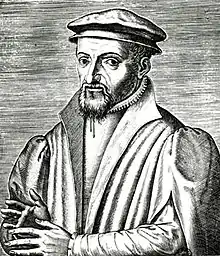Pierre Viret
Pierre Viret (1511 – 4 May 1571) was a Swiss Reformed theologian and Protestant reformer.

Early life
Pierre Viret was born to a devout middle class Roman Catholic family in Orbe, a small town now in Switzerland. He was a close friend of John Calvin.
Viret studied as a scholar in his hometown school and then attended the University of Paris, where he was converted to the Reformed faith. He returned to Orbe in 1531 to escape the persecutions in Paris.[1]
Preaching
William Farel, a Protestant preacher, called Viret to the ministry at his return to Orbe. On 6 May 1531 Viret preached his first sermon, being only twenty years old at the time. His preaching was received with astonishment and acclamation by his hearers, and many were soon converted to the Reformed Faith, among them both Viret's parents.[2] Subsequently, he preached in Lausanne and Geneva, before undertaking missionary tours in France, preaching to crowds of thousands in Paris, Orléans, Avignon, Montauban, and Montpellier. His preaching was sweet and winning, and won him the name of "The Smile of the Reformation."
At one time he was captured by Catholic forces. Viret was considered one of the most popular French-speaking preachers in the 16th century. Above all he was the reformer of the city of Lausanne, where he converted the local population to the Reformed faith. In his time, Lausanne also became, with Geneva, a training ground for Reformation preachers. Among those who studied in Lausanne was the author of the Belgic Confession, Guy de Brès. While at Lausanne, Viret founded a Reformed Academy, which was forced to relocate to Geneva in 1559. The relocated professors and students of Viret's Lausanne Academy soon became the foundation of Calvin’s famed Geneva Academy.[3]

For health reasons Viret left Geneva and moved to Southern France where we preached among the Huguenots. He died in Orthez France in 1571.
Translated works
Viret authored over fifty books. Many have been translated into English, including:
- Anchor of the Soul: An Exposition of the Apostles Creed
- The Catechism of Pierre Viret
- The Christian and the Magistrate: Roles, Responsibilities, and Jurisdictions
- Exposition of the Ten Commandments
- His Glorious Bride
- Jesus Christ, the Believer’s Comfort and Joy
- Letters of Comfort to the Persecuted Church
- Marvelous Trinity
- Simple Exposition of the Christian Faith
Decalogue Commentary Series
- No Other God
- Nothing Like God
- Taking His Name in Vain
- Remember the Sabbath Day
- Honor thy Father and Mother
- Thou Shalt Not Kill: A Plea for Life
- Thou Shalt Not Commit Adultery
- Thou Shalt Not Steal
- Defend the Truth
- Thou Shalt Not Covet
Notes
- J. H. Merle D'Aubigne, History of the Reformation in Europe (Sprinkle Publications, Harrisonburg, VA, 2000).
- D'Aubigne, History of the Reformation in Europe, pages 223-224
- Michael W. Bruening, Calvinism’s First Battleground: Conflict and Reform in the Pays de Vaud, 1528-1559 (Springer, Dordrecht, The Netherlands, 2005), page 254
Sources
- Berthoud, Jean-Marc. "Pierre Viret: Forgotten Giant of the Reformation", Zurich Publishing (2010)
- Linder, Robert D. "Forgotten Reformer." Christian History.
- Viret, Pierre. Oxford Encyclopedia of the Reformation
- Procedures Held With Regard to those of the Religion of the Netherlands (1568)
- Sheats, R. A. "Pierre Viret: The Angel of the Reformation", Zurich Publishing (2012)
- Linder, Robert Dean. "The Political Ideas of Pierre Viret", Droz (1964)
External links
- http://pierreviret.org Website of the Pierre Viret Association
- Pierre Viret: and the Refusal of the Church to Fold Before the Power of the State An article on Viret's views concerning Church and State
- Pierre Viret and Geneva An article dealing with Viret's importance to Geneva
- Several biographies in English and French
- Forgotten Reformer A biographical article in Christianity Today.
- Works by Pierre Viret at Post-Reformation Digital Library